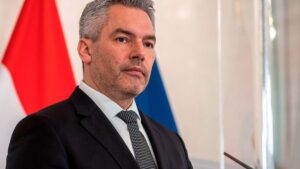
The UK will supply Ukraine with technology and know-how to ensure that Ukraine is never blackmailed or threatened, Prime Minister Boris Johnson said after meeting with the Ukrainian president in Kyiv.
“We – the UK and other partners will supply equipment, technology, know-how, intelligence, so that Ukraine will never be subjected to the horrors of invasion, so that Ukraine will never be blackmailed or threatened in any way,” Johnson said at a briefing with the President of Ukraine in Kyiv on Saturday.
The EU is preparing the next wave of sanctions against the Russian Federation, President of the European Commission Ursula von der Leyen has said.
“We can never match the sacrifice of the Ukrainian people, never can we match that, but we are mobilizing our economic power to make Putin pay a very, very heavy price. We have as you said imposed five waves of unprecedented sanctions against Russia and we are already preparing the next wave,” von der Leyen said at a press conference with Ukrainian President Volodymyr Zelensky in Kyiv on Friday.

The UK will increase economic and sanctions pressure on the Russian Federation, in particular, will affect its ability to use its energy resources, said British Prime Minister Boris Johnson
“It is necessary to provide all kinds of support to Ukraine and together with partners we will increase economic pressure, and we will intensify sanctions against Russia every week. We will not be limited to asset freezes or sanctions against oligarchs – we will also affect Russia’s ability to use its energy resources,” Johnson said at a joint press conference with Ukrainian President Volodymyr Zelensky on Saturday in Kyiv.

The European Investment Bank (EIB) is preparing a EUR4 billion financing program that will help EU member states take in Ukrainian refugees fleeing the war, as well as ensure the development of critical social infrastructure.
“The new EIB programme, awaiting Board approval, aims to finance the development of key social infrastructure to provide public services for refugees, in particular housing, schools, hospitals and kindergartens,” the bank said on Saturday.
The EIB has pledged to support communities to receive refugees and provide them with critical social services during the international fundraising event in support of the victims of Russian aggression “Stand up for Ukraine”, taking place in Warsaw on this day and organized by the European Commission, the Government of Canada and Global Citizen.
The financial assistance will be complemented by free advisory support to assist local authorities in EU Member States in rapidly assessing local needs and in planning, prioritizing and preparing appropriate investment projects.
“We are all stunned by the terrible destruction inflicted on Ukraine and its citizens, millions of whom are fleeing the country in search of peace and security. The horror that we are witnessing only strengthens our resolve to act,” Bank President Werner Hoyer was quoted in the release as saying.
Through our initial Solidarity Package with Ukraine and this new 4 billion euro program for EU member states, we will support Ukraine and also help: with housing, schools, hospitals. I am deeply grateful to President Ursula von der Leyen and Prime Minister Justin Trudeau for their leadership and for mobilizing the global community for Ukraine. The world must match the exemplary courage and resilience of Ukrainians, as well as help them and those who support them.”
The bank recalled that from March 8 to March 25 it had already transferred EUR668 million to the government of Ukraine for emergency liquidity support.
In addition, the EIB is working to provide further funding to enable the government of Ukraine to continue to provide critical public services for citizens remaining in Ukraine. According to the agreements between Hoyer and Prime Minister of Ukraine Denys Shmygal, these funds are provided to support transport, energy, urban development and digital projects.
The EIB will continue to explore opportunities to support Ukraine and Ukrainian refugees together with the European Commission, in particular through the Social Investment and Skills Window component of the recently launched InvestEU programme, the report also says.
According to the UN, Russian aggression against Ukraine has resulted in 7.1 million internally displaced persons and 3.8 million refugees.
The EIB is the long-term lending institution of the European Union. Its owners are the member states of the European Union. The Bank provides access to long-term financing for prudent investment in order to implement European Union policies.

In the week from April 4 to 8, the National Bank of Ukraine again sold more currencies than it bought: dollars – by $ 211 million, euros – by EUR 84.9 million, which, however, is more than two times less than a week earlier, when the “net” sale amounted to $282.1 million and EUR299.8 million.
According to the NBU on its website, this week it bought only $11.5 million and EUR5.5 million, while their sale amounted to $222.5 million and EUR90.3 million.
As reported, in the first week and a half after the war started by Russia on February 24, the “net” purchase of foreign currency by the National Bank amounted to $690.3 million and EUR20 million, since the ban on the purchase of foreign currency had just been introduced, and the list of critical imports had not yet been significantly expanded.
However, in the following weeks, the volume of currency purchases by the central bank began to fall, while the volume of its sale increased. At the same time, last week was the first when the growth trend of “net” sales stopped, and its volumes even slightly decreased compared to the previous week: to the equivalent of $611.9 million from $618.6 million a week earlier, and this week they fell twice at once.
In total, since the beginning of the year, the National Bank has purchased $1 billion 778.8 billion and EUR80.2 million on the market, and sold $4 billion 501.9 million and EUR1 billion 82.7 million, including since the beginning of the war the purchase of foreign currency amounted to $1 billion 121.9 million and EUR80.2 million, and the sale of $1 billion 731.7 million and EUR1 billion 82.7 million.
Ukraine’s international reserves as of April 1, 2022, according to preliminary data, amounted to $28 billion 107.5 million (in equivalent), which is 2% more than at the beginning of March ($27.538 billion).

Austrian Chancellor Karl Nehammer said that Raiffeisen Bank supports sanctions against the Russian Federation and has not invested in the Russian economy since the occupation of Crimea, and the Austrian government does not intend to ignore attempts to circumvent anti-Russian sanctions by anyone.
“Raiffeisen Bank has branches not only in Russia, but also here in Ukraine. Raiffeisen supported our sanctions right away, but we knew from the very beginning, from the time Russia annexed Crimea, that you can’t invest in Russia because it’s risky investments, and there is no support from the Austrian government for Raiffeisen Bank, although it is a very big investor in Ukraine as well. And Raiffeisen Bank itself will try to make efforts to ensure that all sanctions are observed,” Nehammer said at a joint press conference with President of Ukraine Volodymyr Zelensky on Saturday in Kyiv, answering a journalist’s question about the work of Raiffeisen Bank in the Russian Federation.
“In Austria, any attempts to circumvent these sanctions will be punished. We must act with strong, powerful sanctions against Russia. Not only the Austrian Raiffeisen Bank, but also other firms and banks are losing large investments. But the losses that the Austrian economy suffers from sanctions , although they amount to billions of euros, are incomparable with the pain and grief experienced by the Ukrainian people,” the Austrian Chancellor added.
He stressed that Austria will increase sanctions against the Russian Federation until the war is over. “Militarily, we are neutral, but we can never put up with crimes and will help those who suffer from injustice. This means that Austria fully supports the sanctions of the European Union, imposes them on itself, and Austria also supports Ukraine with its capabilities. “What is most needed from Ukraine’s point of view. Within the framework of the European Union, we will further strengthen sanctions until the war is over. And now another package of sanctions has been adopted, and this will not be the last one, with the aim of stopping the war,” Nehammer said. .
According to him, the new package of sanctions will have to be “more powerful and more accurate” – “Russian weapons factories will not receive electronic parts, and without these parts drones will not be able to fly, and weapons will not be able to be used.”
“We will continue on this path, and in the European Union everyone is united, and we will make these sanctions stronger than ever before in the EU. We understand that they are not enough, because people are dying, but we need to these sanctions should be imposed in such a quantity that they are directed against those who cause these sanctions. And all partners in the EU want to stop this war,” the German Chancellor stressed.
He also noted that Austria is making efforts to create effective humanitarian corridors, including for the evacuation of people from Mariupol, Donetsk region, and also promised to support refugees from Ukraine. “There is a lot of solidarity in Austria with those people who were expelled from Ukraine by the war. There is a lot of willingness to help, and this is very common for Austrian society – people want to help and help if they can. I promise that this will not stop,” Nehammer said. .